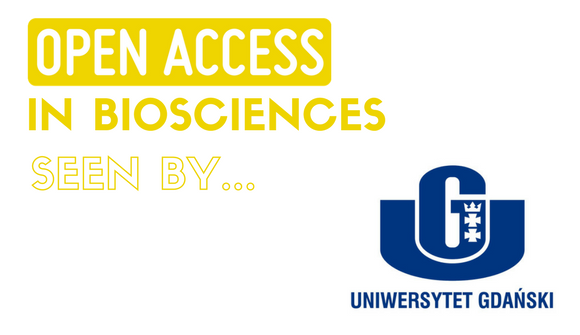How do you understand Open Access in biosciences research?
Open Access (OA) is providing a free-of-charge access to research results – scientific publications – via online access. Individuals and institutions that would otherwise not easily have access to research findings gain knowledge about new discoveries when these information are disseminated in OA. This increases the benefit for society: research findings can be accessed, used and reused, further developed by scientists from different backgrounds and disciplines as well as by non-scientists.
What are the current standards and actions to achieve better Open Access in your University and in your country?
The Polish Ministry for Science and Higher Education supports OA and recommends its implementation by research institutions. Several reports have been published on the state-of-the-art of OA in Poland. There are units and initiatives strongly supporting the development of OA in Poland, such as Platform for Open Science, Coalition for Open Education. Recently, the University of Gdańsk has adopted its policy on OA.
What are you aiming for with the implementation of the STARBIOS2 actions towards better Open Access standards for your institute?
Our goal is to support an institution-wide strategy towards improved OA to the results worked out by our scientists. We believe that OA is only possible with the joint efforts of authors, editors, librarians, supporting staff, and funders. In our project activities we focus on rising awareness among scientists on the importance and benefits of OA. At the same time, we conduct actions aimed at educating authors as well as university in-house editors about tools and mechanism that enable publishing in impacted journals, properly securing copyrights, and granting an open access at the same time.
What kind of actions are you going to establish to fulfill your objectives?
We organise information seminars and workshops on Open Access conducted by invited experts in the field as well as discuss obstacles and solutions to OA publishing, e.g. in panel discussions with bioscience researchers. In our actions, we work closely together with the UG Office for Science and UG Library in order to support the establishing of an OA policy in our university and the development of institutional repositories. In addition, we have also built links to Open Access initiatives from outside our institution.
Who is involved, from your University, in the AP in order to complete your final objective?
The STARBIOS2 Team at the Uiversity of Gdansk consists of staff members from biotechnology, social sciences, faculty, and administration. In activities related to OA our main internal partners are the UG Office for Science and UG Library.
Read also our previous article by the University of Gdansk on Gender in Biosciences.








